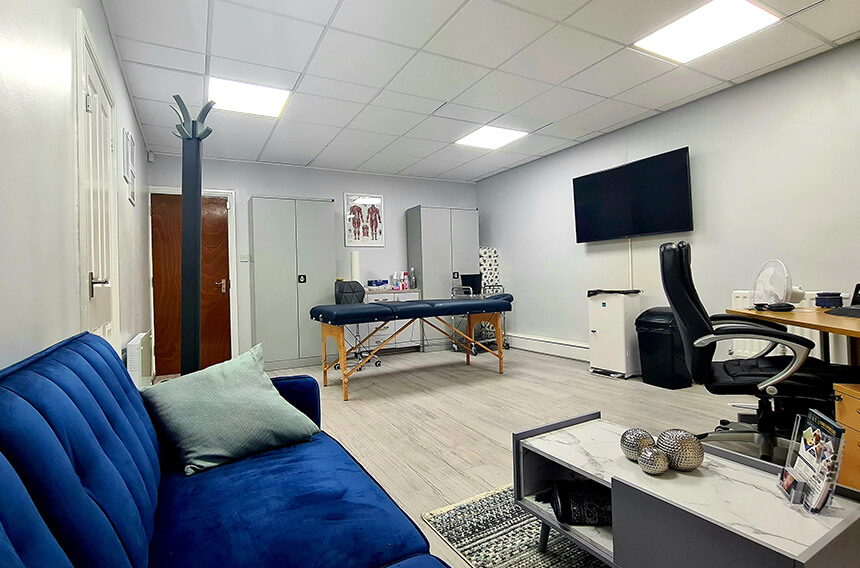Fibromyalgia is a chronic condition characterized by a combination of widespread pain in the muscles, tendons, ligaments, fatigue, and multiple tender points on the body. Tender points are specific areas that are painful or tender when pressure is applied, particularly in the neck, shoulders, upper back, upper chest, elbows, low back, hips, and thighs.
People with fibromyalgia may also experience other symptoms and conditions, such as unrefreshing sleep, irritable bowel syndrome, headaches, TMJ disorders, anxiety, depression, restless legs syndrome, numbness or tingling in the hands and feet, poor concentration, painful menstrual periods, and heightened sensitivity to odors, noises, bright lights and touch.
According to the American College of Rheumatology, fibromyalgia affects up to 12 million people in the United States. Fibromyalgia is more common in women, especially between the ages of 30 and 50.2
So far, scientific support for the claim that any remedy can treat fibromyalgia is lacking.1
:max_bytes(150000):strip_icc():format(webp)/GettyImages-748317273-59a2fa28d088c000111cbf8d.jpg)
S-adenosylmethionine (SAMe)
S-adenosylmethionine (SAMe) is a compound that occurs naturally in the body. It is needed for proper functioning of the immune system, cell membranes, neurotransmitters such as serotonin, norepinephrine, and dopamine, cartilage and DNA.
A couple of preliminary studies suggest that SAMe may help with fibromyalgia. A small double-blind study evaluated the effect of S-adenosylmethionine (SAMe) or placebo in 17 people with fibromyalgia, 11 of whom had depression. The number of tender points decreased after SAMe but not placebo. Depression, as assessed by two rating scales, improved after SAMe but not placebo.
In another double-blind study, 44 people with fibromyalgia took 800 mg of S-adenosylmethionine a day or placebo. After six weeks, there were statistically significant improvements in pain, fatigue, morning stiffness, mood, and clinical disease activity. Tender point score, muscle strength, and mood (evaluated by the Beck Depression Inventory) were not significantly better with SAMe than placebo.
However, another double-blind study compared SAMe (600 mg a day) administered intravenously or placebo in 34 people with fibromyalgia. After 10 days, there was no significant difference in tender points.
SAMe may cause indigestion, dry mouth, and insomnia. Rarely, people experience severe diarrhea, heartburn, headache, and dizziness.
People with bipolar disorder should not take SAMe, as it may worsen manic episodes. People who are taking the drug levodopa (commonly prescribed for Parkinson’s disease) should avoid SAMe. People taking antidepressants should not use SAMe without first consulting their doctor. The safety of SAMe in pregnant or nursing women or children has not been established.
In addition, the efficacy of SAMe is best when you take a product with individually wrapped capsules, as opposed to all together in the same jar.
Magnesium
Magnesium is a mineral found naturally in foods such as green leafy vegetables, nuts, seeds, and whole grains and in nutritional supplements.
Magnesium is needed for more than 300 biochemical reactions. Magnesium, along with malic acid (a fruit acid found naturally in apples) are often suggested for people with fibromyalgia because they are both needed for the generation of energy in cells in the form of adenosine triphosphate (ATP). However, one study of 97 people found no association between magnesium levels and fibromyalgia.
A double-blind study examined the effectiveness and safety of magnesium (50 mg three times a day) and malic acid (200 mg three times a day) in 24 people with fibromyalgia. After four weeks, the magnesium/malic acid combination was not more effective than placebo.
The participants later received six months of the combination in larger doses (up to 300 mg magnesium and 1200 mg malic acid per day) for six months. This time, the combination resulted in a significant improvement in pain and tenderness, however, this portion of the study was open-label (both the researchers and participants know which treatment is being administered) and not blinded, so the results, while promising, cannot be used as evidence that the combination was effective. Further studies are needed.
High doses of magnesium may cause diarrhea, nausea, loss of appetite, muscle weakness, difficulty breathing, low blood pressure, irregular heart rate, and confusion. It can interact with certain medications, such as those for osteoporosis, high blood pressure (calcium channel blockers), as well as some antibiotics, muscle relaxants, and diuretics.
Vitamin D
Fibromyalgia and generalized aches and pains not meeting the diagnostic criteria for fibromyalgia have been attributed by some researchers to vitamin D deficiency. For example, a large German study examined 994 people and found a strong correlation between low vitamin D levels and higher rates and longer duration of generalized bone and/or muscle aches and pains.
A study published in the Mayo Clinic Proceedings examined 150 people with persistent, non-specific musculoskeletal pain in Minnesota. The researchers found that 93% of them had deficient levels of vitamin D.
In another study, vitamin D levels were assessed in 75 people who fulfilled the American College of Rheumatology criteria for fibromyalgia. Although there was no relationship between vitamin D levels and musculoskeletal symptoms, vitamin D deficiency was linked to anxiety and depression in people with fibromyalgia.
5-hydroxytryptophan (5-HTP)
The supplement 5-HTP is thought to work by increasing levels of the neurotransmitter serotonin in the brain. There is preliminary evidence that it may reduce the number of tender points in people with fibromyalgia, possibly by affecting pain-modulating systems in the brainstem.
A double-blind, placebo-controlled study looked at 5-HTP or placebo in 50 people with fibromyalgia. After four weeks, people taking 5-HTP had a significant improvement in pain, the number of tender points, stiffness, anxiety, fatigue, and sleep. Side effects were mild and transient.
Vitamin B12
A Swedish study demonstrated low levels of vitamin B12 in the cerebrospinal fluid of people with fibromyalgia and chronic fatigue syndrome.
Twelve women who met the criteria for both fibromyalgia and chronic fatigue syndrome were studied, along with a control group of 18 healthy women.
Levels of homocysteine in cerebrospinal fluid were over three times higher in the women who had fibromyalgia and chronic fatigue syndrome compared to the control group. Cerebrospinal fluid vitamin B12 levels were also low in 7 out of 12 people with fibromyalgia and chronic fatigue syndrome.
Capsaicin Cream
Capsaicin is the active ingredient in chili peppers. It is thought to temporarily relieve pain.
When applied to the skin, capsaicin cream has been found to deplete substance P, a neurochemical that transmits pain, which desensitizes a person to pain. People with fibromyalgia have been found to have higher levels of substance P.
One study examined the effectiveness of capsaicin in fibromyalgia. Participants in the study applied 0.025% capsaicin cream four times a day to tender points. After 4 weeks, they had a reduction in pain.
A Word From Us
Due to a lack of supporting research, it’s too soon to recommend any alternative remedy for fibromyalgia treatment. In addition, supplements haven’t been tested for safety. Due to the fact that dietary supplements are largely unregulated, the content of some products may differ from what is specified on the product label.
Also keep in mind that the safety of supplements in pregnant women, nursing mothers, children, and those with medical conditions or who are taking medications have not been established. If you’re considering the use of alternative medicine, talk with your primary care provider first. Self-treating a condition and avoiding or delaying standard care may have serious consequences.
OVER 10K HAPPY CLIENTS ACROSS THE UK INCLUDING BIRMINGHAM, WALSALL, DUDLEY, STOURBRIDGE, OLDBURY, WOLVERHAMPTON, COVENTRY, LEAMINGTON SPA, NOTTINGHAM, SOLIHULL, TELFORD, GLOUCESTER, WORCESTER, DERBY, BRISTOL, STOKE AND SUTTON COLDFIELD INCLUDING THE FOLLOWING AREAS:
Acocks Green, Alum Rock, Aston, Balsall Heath, Birmingham City Centre, Bordesley Green, Bromford, Castle Vale, Digbeth, Edgbaston, Erdington, Garretts Green, Great Barr, Hall Green, Handsworth, Harborne, Hay Mills, Highgate, Hockley, Hodge Hill, Jewellery Quarter, King's Heath, Kings Norton, Kingstanding, Kitts Green, Ladywood, Lozells, Moseley, Nechells, Newtown, Northfield, Nuneaton, Pelham, Perry Barr, Quinton, Saltley, Selly Oak, Selly Park, Shard End, Sheldon, Small Heath, Smethwick, South Yardley, Sparkbrook, Sparkhill, Stechford, Tipton, Tyseley, Ward End, Washwood Heath, Wednesbury, West Bromwich, Winson Green, Witton, Yardley, Yardley Wood
Our therapists are fully insured for all services we provide. Qaya Clinic is based in Edgbaston Medical Village, Birmingham City Centre. WE ARE OUTSIDE THE CLEAN AIR ZONE with free nearby parking.






